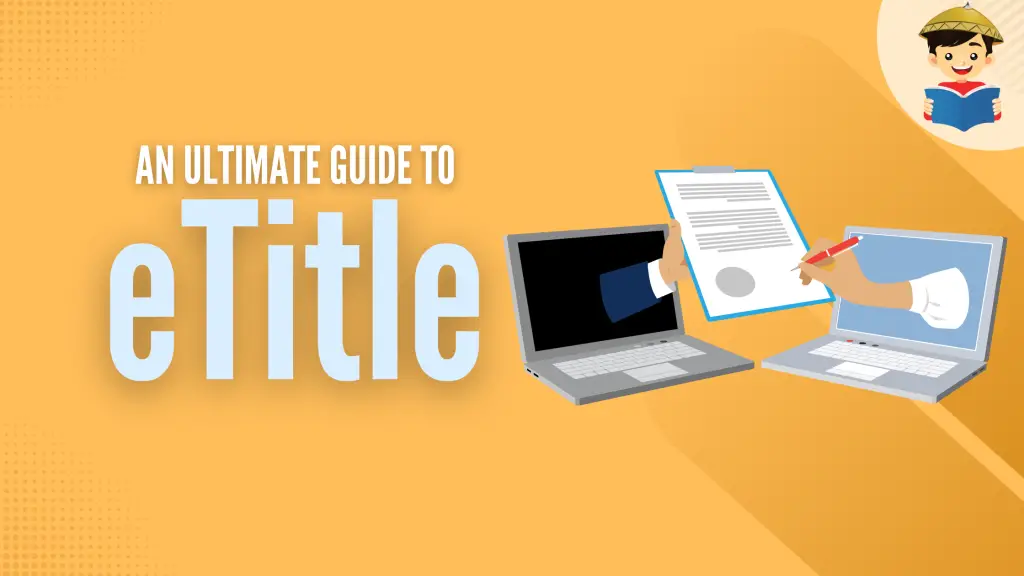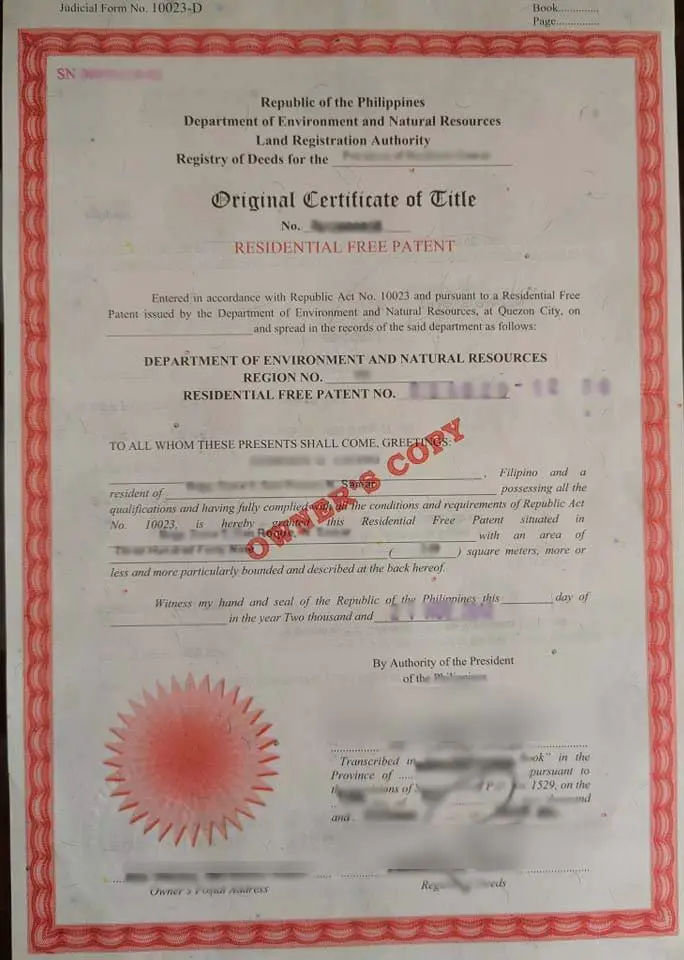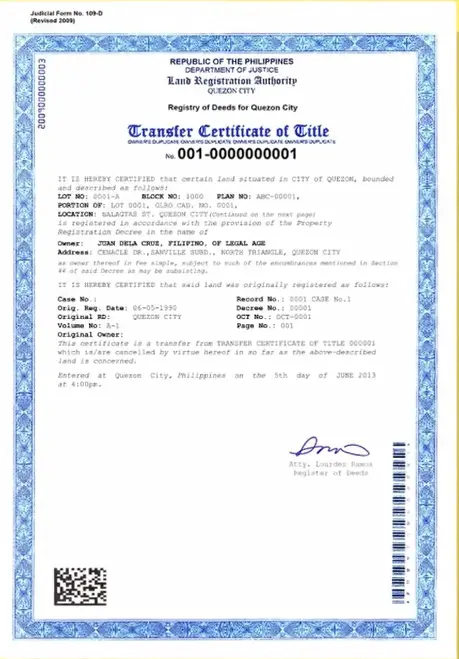How To Convert Your Land Title to an eTitle

Have you heard of an electronic title or eTitle and wondered how you could get one? With the world going digital these days, eTitle is now possible in the Philippines. The Land Registration Authority has a “Title Upgrade Program1 ”, which lets you convert your manually-issued title into an eTitle.
In this article, let us discuss what an eTitle is, its benefits, and how you can convert your current manually-issued title into an eTitle in a few easy steps.
DISCLAIMER: This article has been written for general informational purposes only and is not legal advice or a substitute for legal counsel. You should contact your attorney to obtain advice with respect to any particular issue or problem. The use of the information contained herein does not create an attorney-client relationship between the author and the user/reader.
Table of Contents
- What Is an eTitle?
- Benefits of the eTitle
- How To Convert Your Manual Title Into eTitle
- Tips and Warnings
- Frequently Asked Questions
- References
What Is an eTitle?

The Electronic Certificate of Title or eTitle is the digital equivalent of the manually-issued title. In the Philippines, a land title or the Certificate of Title has two physical copies. One is the Original Certificate of Title kept in the vault of the Register of Deeds (RD), and the other one is called the Owner’s Duplicate Copy and is kept by the registered owner. Both of these titles look the same, made of a special type of paper and manually issued.
With eTitle, the Original Certificate of Title (the copy kept by the Register of Deeds) is no longer on paper but already the digital version of the title. On the other hand, what is issued to the registered owner (or the Owner’s Duplicate Copy) is the paper version of the digital title.
Previously, when there was a transaction involving land title (e.g., request for annotations of mortgage, sale, lease), the RD had to find the original paper Certificate of Title from its vault. This poses a challenge as the process may involve searching from more than 16.6 million titles in 159 Registry of Deeds nationwide2. With eTitle, the LRA or RD has to retrieve it only from its database system, which will make all transactions easier, faster, and smoother going forward.
Benefits of the eTitle
- eTitle is safer compared to the traditional manually-issued title. By its nature, paper titles can be lost, destroyed, misplaced, or decayed over time. In case of natural disasters such as fire, typhoons, or earthquakes, paper titles are at risk. There were some cases in the Philippines, such as in Isabela3 and Quezon City4, where the office of the Register of Deeds caught fire and the paper titles were burned.
- It is not susceptible to tampering compared to a paper title which is easier to fake, substitute, or insert with questionable data.
- eTitle is easy to reconstitute. When a paper title is lost, the owner must go through the tedious and expensive judicial or administrative reconstitution process. Reconstitution of titles is no longer a problem with eTitle. Since the eTitle is stored in electronic form and regularly backed up, the original title stored in LRA’s database is not susceptible to loss.
- It is more accessible compared to a paper title as the RD doesn’t need to retrieve the original physical copy of the title in its vault, thus facilitating faster transactions such as annotations of loans, mortgages, or sales.
- Certified True Copies of Title taken from an e-Title are clearer compared to manually-issued titles where data are sometimes blurred or unreadable.
How To Convert Your Manual Title Into eTitle
Conversion of manually-issued titles happens in two cases. The first is when you have a voluntary transaction with the Register of Deeds. Voluntary transaction means you went to the Register of Deeds to have a transaction (e.g., sale, mortgage, lease) annotated in the title. During the processing of your transaction, the RD will also convert your manually-issued title into eTitle.
The second is the Standard Conversion, or when the registered owner voluntarily requests the Register of Deeds to have his or her title converted into eTitle. This guide is for this type of transaction.
What Are the Requirements?
- Copy of a valid Government-issued ID (i.e., Driver’s License, GSIS, SSS, HDMF, PhilHealth, Passport, Postal ID) of the presentor.
- Special Power of Attorney (SPA) if an agent is representing the registered owner.
- For corporations, a duly notarized Secretary Certificate or Board Resolution authorizing a representative to file the conversion request with the Registry of Deeds.
- The Owner’s Duplicate of Certificate of Title and all issued Co-owner’s Duplicate of the Certificate of Title, as the case may be.
Step-by-Step Guide
- Visit the Land Registration Authority (LRA) or the Register of Deeds (RD)
- Submit a Conversion Request Form together with a copy of the Owner’s Duplicate Certificate of Title and other supporting documents
- Pay the corresponding processing fees. The system automatically computes the fees. After the payment, the LRA or RD will then conduct the title conversion process, and if everything is in order, a new Electronic Certificate of Title or eTitle is created. The owner’s Duplicate Copy of the eTitle will be printed with a unique system-generated title number and issued to the registered owner.


- Claim your eTitle on the day of its release. Once the manually-issued title has been converted into eTitle, all succeeding transactions involving the land shall be processed using the new eTitle. Your old title will be deactivated.
Tips and Warnings
- Use LRA’s Online Tracking System (LOTS) to follow up on the status of your transaction. LOTS will save you time, effort, and money as you don’t have to go back and forth to the Register of Deeds to see if your eTitle is ready.
- Surrendering the Owner’s Duplicate Copy of the Certificate of Title and all issued Co-Owner’s Duplicate Copy to the LRA or RD is a must; otherwise, the LRA or RD will deny your request for eTitle conversion.
Frequently Asked Questions
1. Are eTitle admissible in court?
Yes, eTitles are admissible in court. Like paper titles, eTitles are printed using a special paper with security features and a unique system-generated title number. eTitle can be introduced as documentary evidence following the Revised Rules on Evidence5.
2. Can I use an eTitle to sell my land?
Yes, you can use an eTitle to sell your land. The information contained in the eTitle is the same as the manually-issued title. All the annotations, if any, from the old title are also copied en toto to the eTitle. The Owner’s Duplicate Copy of the eTitle is printed using a special paper with security features and a unique system-generated title number. After the conversion of the manually-issued title, your land title information is now digitized and stored securely in LRA’s database.
3. How much does it cost to convert my land title to an eTitle?
LRA encourages registered owners to convert their manually-issued title into eTitle as the cost is minimal. Below is the rate* for conversion.
LRA Fees
| 1. Entry Fee | ₱30 per entry |
| 2. Registration Fee | ₱30 for the Verified Petition; ₱120 for the SPA; ₱120 for Secretary’s Certificate or Board Resolution |
| 3. Issuance of Certificate of Title Fee | ₱60 per title issued; ₱30 per additional parcel of lot |
| 4. Issuance of Additional Copy of Certificate of Title Fee | ₱60 for the first page; ₱30 for each subsequent page |
| 5. Annotation Fee | ₱30 per annotation |
| 6. Judicial Form Fee | ₱30 per title issued |
IT Services (subject to Value-Added Tax)
| Service Fee for Registration of Deeds | ₱344.98 per deed/instrument processed for registration, including, but not limited to supporting |
| Service fee for the issuance of Certificate of Title | ₱215.58 per title issued |
4. I am currently abroad. Can I assign someone to process the conversion of my land title in the Philippines into an eTitle?
Yes, you can assign someone by executing a Special Power of Attorney (SPA) specifically authorizing your representative to file the conversion request and have the SPA attested by the appropriate consular official in your current place abroad.
References
- National Irrigation Administration (NIA). (2016). Memorandum Circular No. 65, s. 2016. Retrieved from http://omcrs.nia.gov.ph/?q=system/files/mc/2016-065.pdf
- Land Registration Authority (LRA). (2019). Surrender of old Manual Titles for upgrading to Electronic Title. Retrieved from https://www.lra.gov.ph/notice-to-the-public#cont
- Visaya Jr., V. (2016). Fire razes registry of deeds building in Isabela, 1 hurt. Retrieved 4 July 2022, from https://newsinfo.inquirer.net/791150/fire-razes-registry-of-deeds-building-in-isabela-1-hurt
- Echeminada, P. (2003). More reconstructed land titles in QC. Retrieved 4 July 2022, from https://www.philstar.com/metro/2003/08/30/219087/more-reconstructed-land-titles-qc
- Official Gazette. 1989 Revised Rules on Evidence (1989).
- Land Registration Authority (LRA). (2011). LRA Circular 27, s. 2011. Retrieved from https://dokumen.tips/documents/lra-circular-no-27-2011.html
Written by Atty. Kareen Lucero
Atty. Kareen Lucero
Kareen Lucero is a lawyer previously doing litigation before working for different agencies in the government and for a multinational corporation. She has traveled to 52+ countries including a 3-month solo backpacking in South East Asia and more than 1 year of solo traveling across four continents in the world. As part of giving back, she is passionate about sharing her knowledge of law and travel. She is currently doing consulting work for a government agency. For inquiries, you may reach her via Facebook Messenger (https://m.me/kareen.lucero.77) or email ([email protected]).
Copyright Notice
All materials contained on this site are protected by the Republic of the Philippines copyright law and may not be reproduced, distributed, transmitted, displayed, published, or broadcast without the prior written permission of filipiknow.net or in the case of third party materials, the owner of that content. You may not alter or remove any trademark, copyright, or other notice from copies of the content. Be warned that we have already reported and helped terminate several websites and YouTube channels for blatantly stealing our content. If you wish to use filipiknow.net content for commercial purposes, such as for content syndication, etc., please contact us at legal(at)filipiknow(dot)net